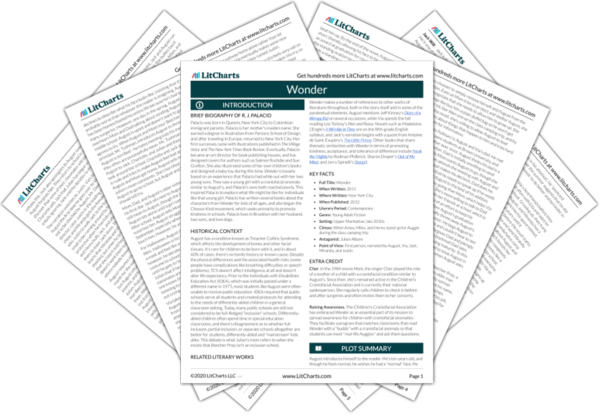For their yearly musical, Via’s school chooses to put on a production of Our Town. For all the adolescent individuals involved, Our Town represents a major shift in their growing independence and coming of age. For August, it's the first time he truly feels like he's seeing an adult piece of theatre, not a children's show. For Via, it ends up being one of the few times in her life that her parents unequivocally celebrate her and her accomplishments. Playing the lead unexpectedly also allows her to feel adult and independent. In the case of Miranda, who was originally cast as the lead, the play presents a number of opportunities for her to "choose kind," as she advocates for the theatre director to choose anything but the play The Elephant Man (which she felt wouldn't go over well with the Pullman family) and then feigns illness to give Via the opportunity to perform. In all cases, the play represents a major moment of growth and development for the book’s characters.
“Our Town” Quotes in Wonder
it's just been so nice being in a new school where nobody knows about him, you know? nobody's whispering about it behind my back […] but if he comes to the play, then everyone will talk about it, everyone will know […].

Unlock explanations and citation info for this and every other Wonder quote.
Plus so much more...
Get LitCharts A+"Auggie!" Mom yelled. "That's not true!"
"Stop lying to me, Mom!" I shrieked. "Stop treating me like a baby! I'm not retarded! I know what's going on!"
I don't even know how I got so mad. I wasn't really mad at the beginning of dinner. I wasn't even sad. But then all of a sudden it all kind of just exploded out of me. I knew Via didn't want me to go to her stupid play. And I knew why.
"Daddy, can you please not call me Auggie Doggie anymore?" I whispered in Dad's ear.
Dad smiled and nodded and gave me a thumbs-up.
I knew right then and there that I was going to like the play. It wasn't like other school plays I've been to, like The Wizard of Oz or Cloudy with a Chance of Meatballs. No, this was grown-up seeming, and I felt smart sitting there watching it.












